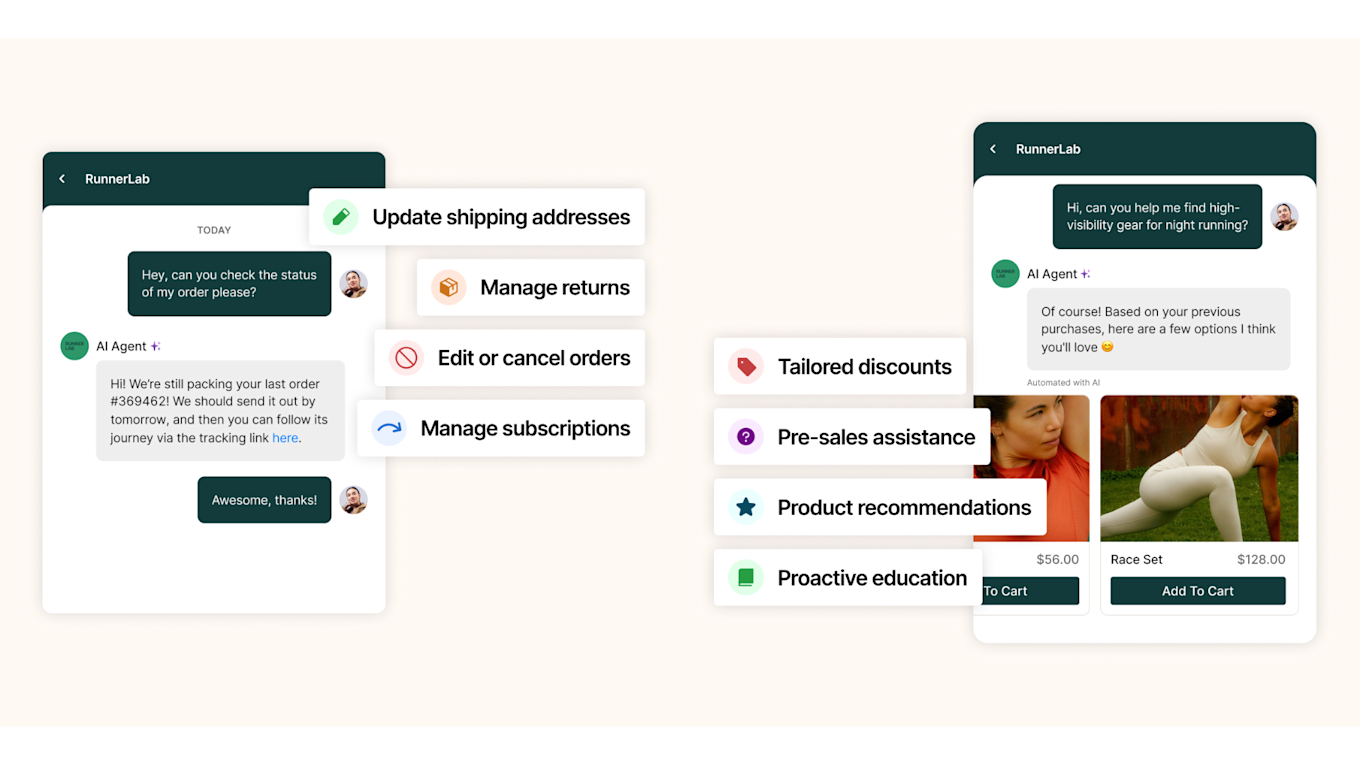The best AI tools for eCommerce

On this page
Helpful AI tools to enhance customer support, Shopify, image optimization, and SEO.
Trying to get ahead in eCommerce with helpful AI tools? This article highlights some great AI websites (some are FREE) that can help you reach your audience faster. This is intended to be a helpful guide on what AI is and how to use it to your advantage both effectively and ethically.
What is AI? Does it really affect our lives?
AI stands for Artificial Intelligence and it refers to applying human knowledge into machines to increase efficiency in areas such as data gathering and retrieval by allowing computers to recognize patterns, make decisions, and even perform tasks such as speech recognition, image analysis, and problem-solving.
We actually see AI being used in many aspects of our everyday lives including something as common as our iconic smartphone assistants like Apple’s Siri and Amazon’s Alexa.
How is AI changing eCommerce?
AI is involved with many aspects of eCommerce including inventory management, forecasting, and personalizing marketing for customers.
According to an article by Financial Times, “Amazon steps up use of robotics in warehouses”, as of March 2025, Amazon has integrated over 750,000 mobile robots and tens of thousands of robotic arms across its warehouses. This extensive use of AI-driven robotics has led to a 25% reduction in order fulfillment costs, with projected annual savings of $10 billion by 2030.
Moreover, a recent article by Axios, "Axios Event: ‘Technology is at the heart of retail,’ enhancing personalization, says Ulta Beauty CMO”, highlights that since 2018, Ulta Beauty (a large US-based retailer specializing in makeup and hair products) has utilized AI to analyze customer shopping habits, enabling personalized marketing strategies. This approach enhances customer engagement and reflects the broader retail trend of leveraging AI for tailored shopping experiences.
Overall, AI is increasingly shaping how we interact with technology, businesses, and society.
How can we take advantage of the use of AI in eCommerce?
While many AI tools such as ChatGPT focus solely on generating text, the best ones go beyond that, delivering real value to customers and merchants alike. From AI-driven customer support to smart product recommendations and image optimization, these tools enhance user experience and boost conversions.
In this blog, YYT will recommend some of the most helpful AI tools for eCommerce.
Available AI Tools
1. Gorgias - Conversational AI for Enhanced Customer Support
Website: Gorgias
Gorgias is a conversational AI tool that helps businesses streamline customer inquiries, providing instant responses and valuable information. What sets Gorgias apart is its ability to integrate with a store’s product catalog, enabling it to suggest relevant products and answer questions with accurate product details.
Key Benefits:
Reduces response time and increases customer satisfaction.
Automates responses to common queries, freeing up human agents.
Enhances decision-making by offering real-time product recommendations.

2. Shopify Personalization AI - AI-Powered Product Recommendations
Website: Personalization AI-Suggestions
Personalized shopping experiences significantly impact conversion rates and customer retention. Shopify’s Personalization AI-Suggestions is a tool that analyzes customer behavior and browsing history to provide tailored product recommendations.
Key Benefits:
Offers personalized shopping experiences, increasing conversion rates.
Improves upselling and cross-selling strategies with smart recommendations.
Uses machine learning to continuously refine suggestions based on customer preferences.
3. AI Image Optimization - Photoroom AI Upscale
Website: Photoroom AI Upscale
Photoroom AI Upscale helps businesses enhance the quality of their product photos by improving resolution, removing background noise, and making images look more professional. This is especially useful for small businesses that may not have access to professional photographers.
Key Benefits:
Enhances image quality, leading to better engagement and conversions.
Removes the need for expensive photo shoots or manual editing.
Automatically scales images for various platforms, ensuring consistency.
4. SEO Optimization - SemRush
Website: SemRush
SemRush is an AI-driven SEO tool that helps businesses improve their search rankings by providing keyword research, backlink analysis, and content optimization strategies. With AI-driven insights, businesses can ensure that their online store is visible to the right audience.
Key Benefits:
Improves search rankings through advanced keyword research.
Identifies SEO gaps and opportunities to enhance website visibility.
Analyzes competitors and provides insights to outperform them.
The Pros and Cons of AI in eCommerce
Pros | Cons |
|---|---|
Efficiency & Automation: AI automates repetitive tasks like customer inquiries, product recommendations, and SEO analysis, freeing up human resources. | Lack of Human Touch: While AI can provide quick responses, it may struggle with nuanced customer interactions requiring empathy. |
Improved Customer Experience: AI-driven chatbots and personalization tools create a seamless shopping experience tailored to individual preferences. | Privacy Concerns: AI relies on customer data, making privacy and security a major concern. |
Data-Driven Decisions: AI tools analyze vast amounts of customer data to provide actionable insights that drive sales. | Plagiarism: By using available data, AI sometimes produces content that closely resembles existing works, leading to unintentional plagiarism. |
Conclusion
We have seen that AI can deliver incredible value for your brand, thanks to its ability to track patterns, process large amounts of data to scale the performance of your work, and provide basic solutions and feedback to improve customer experiences.
However, if not used correctly, it might not be as useful due to its inability to perform complex tasks that require deeper thinking, its lack of human connection to empathize with the specific needs of a customer or client, and the challenge it poses to the uniqueness of our company compared to our competitors.
Therefore, we recommend always balancing the human touch with the efficiency of technology—utilizing AI as a useful tool to enhance the skills your organization already possesses.


